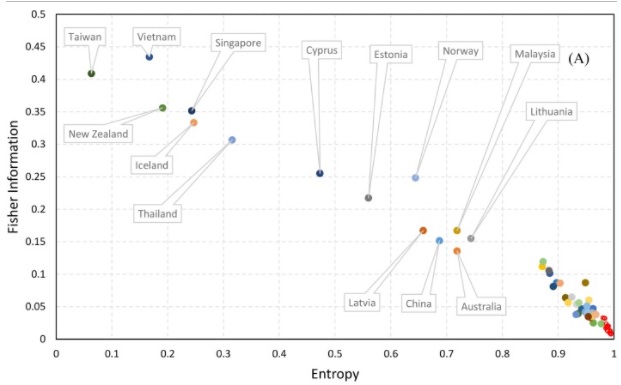COVID-19: research investigates the evolution of lethality worldwide
25/06/2021
Fiocruz Pernambuco
A study developed in partnership between Fiocruz Pernambuco, the Federal Rural University of Pernambuco (UFRPE) and the Federal Institute of Paraíba (IFPB) carried out an investigation on the evolution over time of the daily numbers of deaths by COVID-19, taking into account the scenario in 43 countries. Using physical approaches and information theory techniques, the researchers achieved results that give scientific evidence as for the efficiency of measures such as the use of face masks, social distancing, quarantines, mass testing, and education on hygiene, to restrict the impacts of the disease. The research showed that countries that behaved in a proactive fashion in the implementation of these public health measures presented higher predictability (less entropy) to lethality by COVID-19.
Conversely, countries that were reactive in the implementation of these measures had less predictability (more entropy). “In face of this, our findings show that these preventive measures are efficient in the fight against the lethality of COVID-19”, say the scientists of the article Predictability of COVID-19 worldwide lethality using permutation-information theory quantifiers, published in Results in Physics of the Elservier platform.
The methodology adopted in the study used the quantifiers of information theory, more specifically permutation entropy and Fisher’s information. The figures cover the approximate period of a year, between February 19th, 2020, and January 6th, 2021.
“The use of permutation entropy and of Fisher’s information to quantify the disorder of time series of deaths by COVID-19 is an innovative approach, bringing together the physics of biological phenomenon and bringing to light the understanding of the ongoing pandemic. This approach places our group in the vanguard of the comprehension of COVID-19 dynamics”, explains Fiocruz researcher Bartolomeu Acioli, coordinator of the study.
“Based on a perspective of public health, our methodology is a robust approach to subsidize decision-making by public agents on efficient measures to address the current pandemic”, declares UFRPE professor Leonardo Fernandes, a partner in the research and lead author of the paper. The research group also includes IFPB professors Fernando Araújo and Angélica Silva.
The nine countries best ranked in the research are Taiwan, Vietnam, New Zealand, Singapore, Iceland, Thailand, Cyprus, Estonia, and Norway. Throughout the period under analysis, these places had a few common characteristics, such as less than 25 accumulated deaths per 100 inhabitants and no peak of deaths that could be characterized as a wave, as occurred in other countries.
The countries with the highest entropy, i.e. those located the lowest in the ranking, were Argentina, South Africa, Belgium, Iran, Czech Republic, India, Peru, Colombia, and Italy. The authors explain that all these countries experienced some moment of explosion in the number of deaths, characterized as one, two, or even three contamination waves. In the case of Italy, the first Western country to experience the new coronavirus epidemic and the lowest-ranking country in this study, the growth in the number of cases and deaths was exponential as early as in the first months. In spite of the high number of deaths by COVID-19 recorded in the interval under study, the United States and Brazil are in an intermediate position in this ranking - 15th and 16th, respectively.




